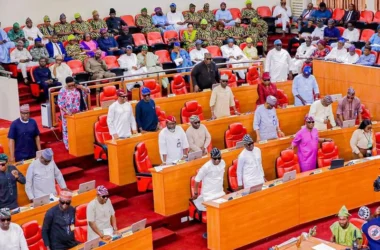The Joint Action Committee (JAC) of the Non-Academic Staff Union of Educational and Associated Institutions (NASU) and the Senior Staff Association of Nigerian Universities (SSANU) has announced an indefinite strike over unpaid salaries, effective since Monday. With government officials yet to intervene, the strike has shut down universities nationwide, leaving many students and staff uncertain about when academic activities will resume.
The strike began following a dispute over four months of withheld salaries for non-academic university staff and senior administrators, including vice-chancellors, bursars, and registrars. Speaking with The PUNCH, the National President of SSANU, Mohammed Ibrahim, stated that compliance across universities had reached nearly full participation. ”
He said, “It is a long-term battle because this strike also involves vice-chancellors, bursars, registrars, and other senior administrators who were not paid. The impact is significant, and no one from the government has reached out to us. We have withdrawn our services, and our members are resolute they will not return to work until all salaries are paid.”
As of Wednesday, both Ibrahim and the SSANU Vice President, Abdussobur Salaam, confirmed that no formal communication had been received from the government. Ibrahim further explained that university executives had been left unpaid, and he stressed the need for the government to prioritize the welfare of educational staff.
“There’s no update on the ongoing strike, it continues. Some informal contacts were made between the minister of state for education and our union executives, but there’s been no real progress, just an informal appeal.
“This issue has persisted for a long time, with repeated promises that have not been fulfilled.
“All our ultimatums have expired, and we still haven’t received any alerts. The recent invitation was just an informal call on the phone. We urge the authorities to take decisive action; we have come too far and can no longer accept empty promises. If we don’t get the alerts we won’t back down, Salaam said.
The timing of the strike coincides with a change in leadership within the Ministry of Education. Dr. Tunji Alausa, newly appointed to the position of Education Minister, inherits the unresolved issue as he takes office following the removal of former Minister Tahir Mamman. Despite informal conversations between union leaders and the Minister of State for Education, Salaam confirmed that there had been “no real progress,” with government appeals offering little more than unfulfilled promises.
The unions are seeking immediate payment of withheld salaries, improved allowances, and full implementation of past agreements. SSANU and NASU have repeatedly pressed the government to act, but the situation remains unresolved. In a joint statement released by Ibrahim and NASU’s General Secretary Peters Adeyemi, the unions expressed frustration, noting that the ultimatum given to the government had expired without action.
Meanwhile, the National Association of Academic Technologists (NAAT) has also announced a nationwide protest, adding further tension to the education sector. The protest, planned to begin on November 6, is in response to five months of unpaid salaries and unfulfilled agreements. NAAT President Ibeji Nwokoma said that failure by the government to meet their demands by November 13 could lead to an indefinite strike affecting universities, polytechnics, and colleges of education.
Nwokoma outlined the union’s demands, including funding for laboratory upgrades and improved staff-student ratios. According to NAAT, despite presidential approval for salary payment, the Ministry of Finance has not yet implemented the directive, further straining relations between unions and the federal government.










